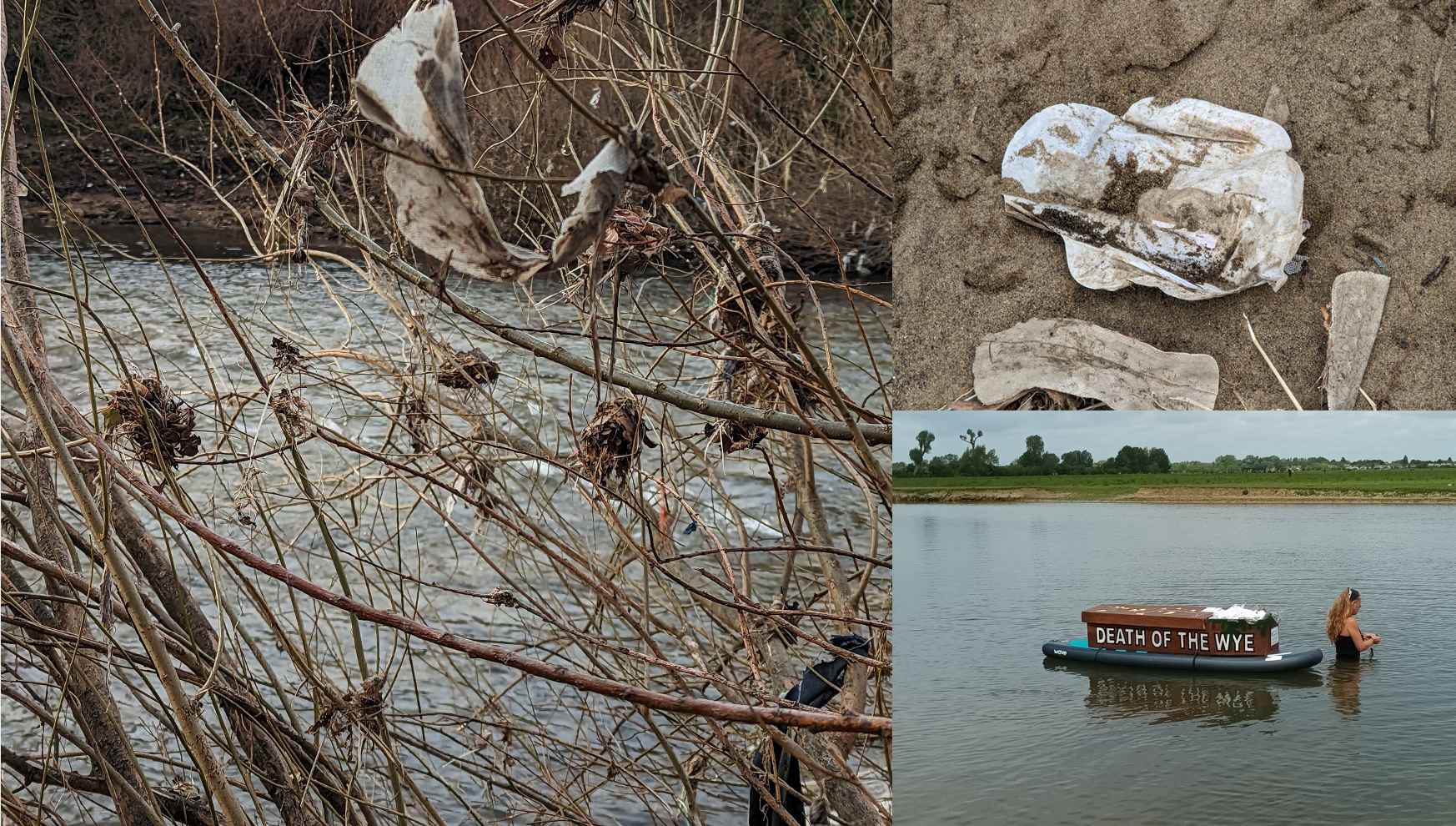The River Taff has been included on a list of worst polluted rivers in the UK
THE trees lining the banks of the River Taff in Llandaff North are visibly strewn with plastic, sanitary towels toilet wipes and other waste.
In recent weeks, as water levels fell after recent floods, residents across Cardiff have been cleaning up sections of the Taff.
The Llandaff North Residents’ Association, Friends of Hailey Park and YGC Rebel Mams are some of the groups that arrange weekly litter picks along the riverbanks.
Pam French, one of the Rebel Mams, says the river is in the worst state she’s ever seen it.
“The banks of the river and the river itself have become increasingly worse,” she said.
“The amount of sanitary towels and wipes is absolutely horrific at the minute and we’re trying to clean that all up on our own.
“We went out for about an hour and we collected around 40 sanitary towels, on top of all of the wipes and other plastics. We know that the only way these sanitary pads get into the rivers is because the water company has put them there.
“It’s ironic – we urge people just to flush the three p’s; paper, poo and pee, but if people hadn’t put their sanitary pads down the toilet, we wouldn’t be so aware of the sewage being released, and we wouldn’t have the proof.
“They act as markers and is absolute evidence of exactly what is going on.”
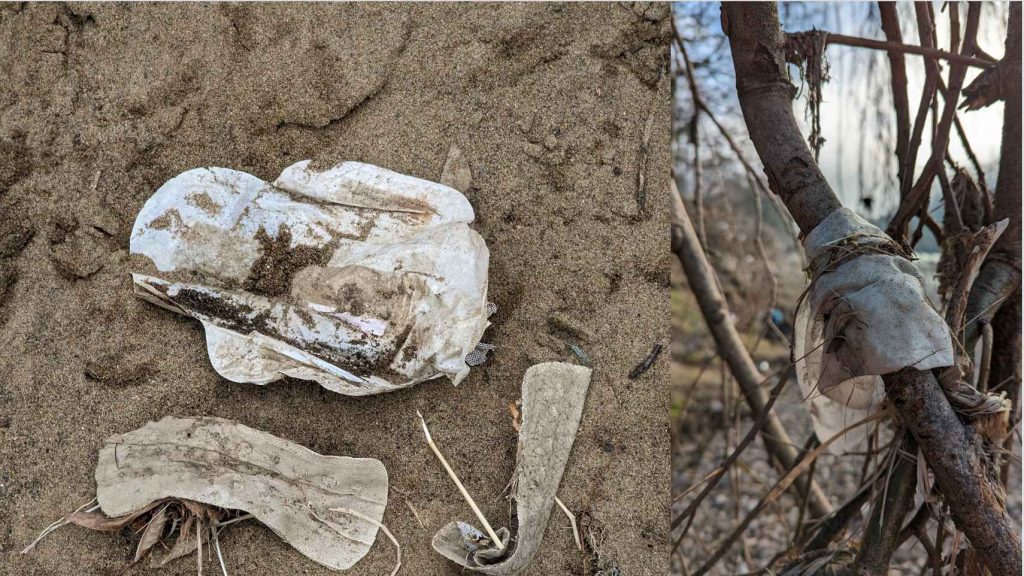
The most polluted rivers in Wales
Over the course of just one year, more than 740,000 hours – or 30,833 days – worth of raw sewage was pumped into Welsh rivers.
Recent data from the Environment Agency – analysed by Top of the Poops – revealed a list of the worst polluted rivers in the UK, which includes six Welsh waterways; the River Teifi, River Usk, River Wye, River Tawe, Menai Strait, and River Taff.
The Taff is a 35-mile river that runs from Merthyr Tydfil to Cardiff Bay. In 2021, Welsh Water recorded more than 30,000 hours of sewage had been released into the river. This equates to 1,250 days.
The data records multiple sewage pipes per river. As an example of how the data can record more hours than there are in the day (or days in the year), there may be five sewer outlets one one river, each running for five hours, which would equate to 25 hours pumping in one day.
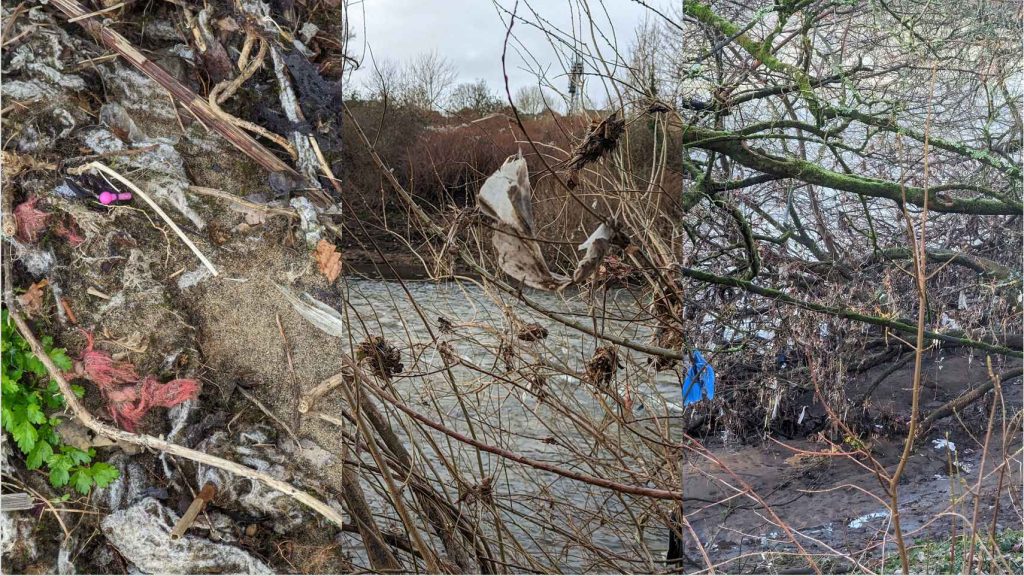
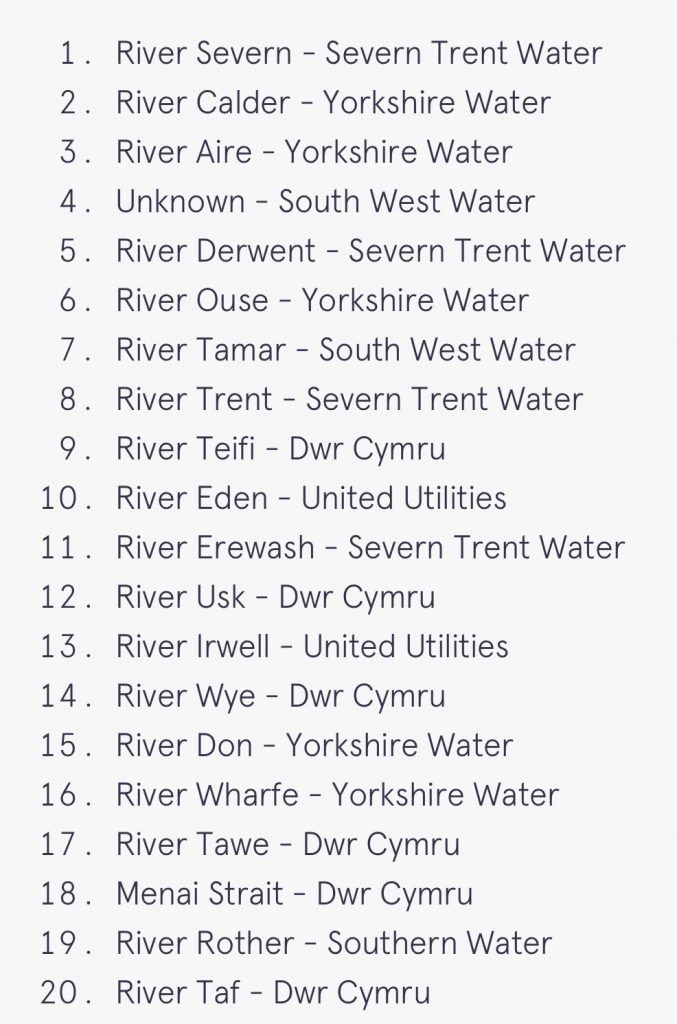
In 2021 there were at least 470,000 “sewage spills” in England and Wales, according to the figures from Top of the Poops. Combined, they add up to more than 3.4 million hours across the year.
The figures were also likely an underestimate because the companies don’t always reliably collect data, with some monitoring defective, or absent entirely, it said.
However, the River Taff isn’t the only river that has seen increasing problems with pollution. Also on the list is the River Wye, which flows through the protected landscape of the Wye Valley Area of Outstanding Natural Beauty on the border between Wales and England.
The Welsh environmental regulator, Natural Resources Wales (NRW), has for the first time publicly acknowledged that diffuse pollution from the intensive poultry industry in Mid Wales is directly linked to damage to protected species in the River Wye.
Angela Jones, AKA the ‘Wild Woman of the Wye’, is an environmental campaigner who has been swimming in the River Wye for almost 40 years. She sees the pollution first hand and began campaigning six years ago.
“I knew our rivers were in trouble when I started to smell, taste and see what was happening to them when I swam in them,” said Ms Jones.
“I never wanted to become an environmental campaigner, but I can’t stand by and watch our rivers die.”
After realising that the water regulators weren’t doing enough, Jones and a growing group of volunteers began monitoring the river, filming any discharges into the water and reporting them to environmental watchdogs.
She has now trained up more than 300 volunteers to test the water for pollutants and officially record their findings.
Watch Angela Jones’ full interview here:
Why is this happening?
Welsh Water controls more than 36,000 kilometres of sewers in Wales. This network takes dirty water away from toilets to be cleaned at local treatment works, which then gets released into the rivers and the seas.
However, when it rains heavily, the sewage system gets overloaded and the excess water must be diverted directly into rivers.
This diversion requires no treatment and the sewage only passes through a filter designed to catch items like sanitary pads and nappies. This raw filtered sewage, mixed with rainwater, then goes into the rivers. These spills are referred to as Combined Sewer Overflow or Combined Storm Overflow (CSO).
Kim Waters is a member of the Welsh Rivers Union, a charity that helps educate communities on the issues that their local river is facing and advises on how communities can help.
“This sewage system has been the same design for many a year,” said Mr Waters.
“The issue is that these spills were meant to be an exceptional thing, rather than being the norm, which it is now becoming.
“This water isn’t just poo and pee. There are pharmaceuticals, narcotics and any number of household chemicals.”
However, raw sewage isn’t the only issue facing our rivers. Agriculture and chicken farming are an equally – if not bigger – threat to the waters in some areas.
“Each river system has its own nuance of what’s causing the pollution, like an algorithm of death,” said Mr Waters.
“The Wye is particularly impacted by Herefordshire and Powys being the ‘chicken capital of Britain’. There’s around 30-40 million chickens being farmed there, with their manure often being released directly into the river, with little to no regulation.
“All the streams are tainted by a mixture of all these factors.”
What does Welsh Water say?
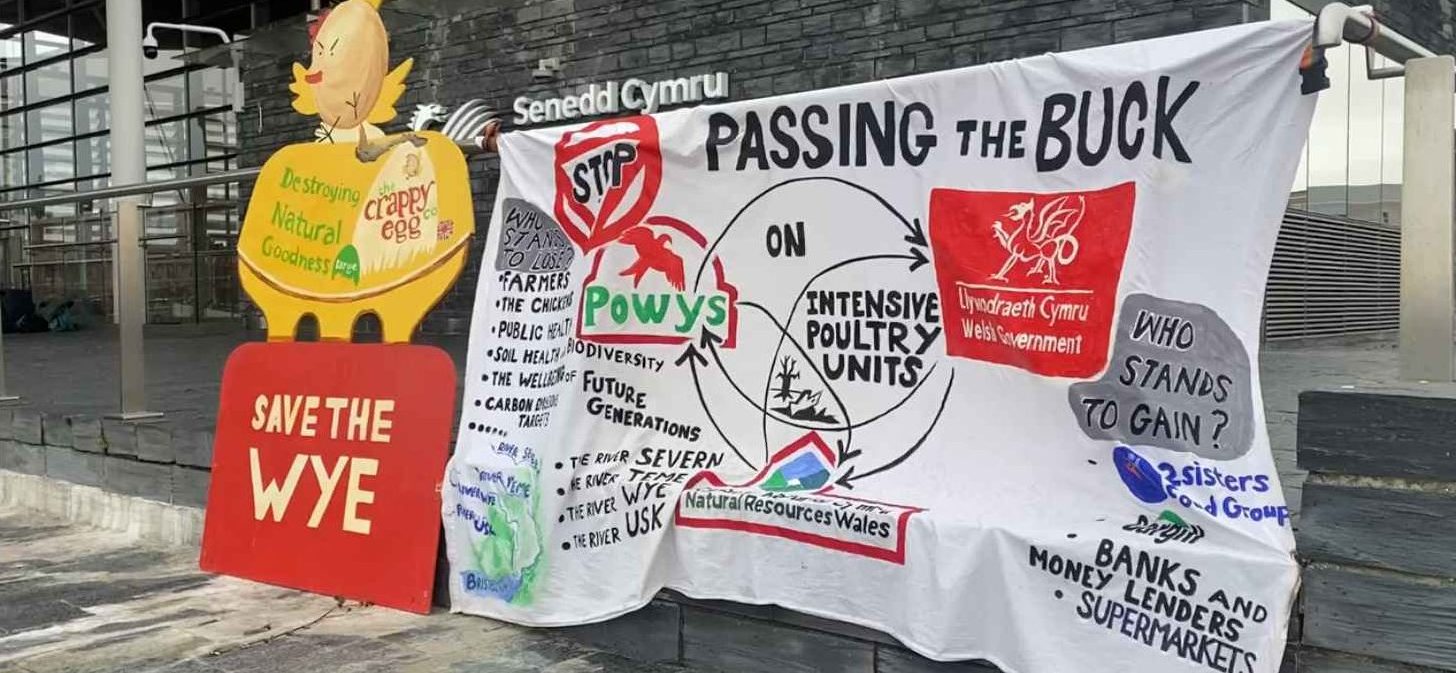
Welsh Water states that the high number of sewage spillages in Wales is due to the fact that these are the wettest parts of the British Isles, and as a result it is unsurprising that sewers become overburdened. They also said that they had more monitors on their systems than any other water company and so can provide more data than their counterparts elsewhere.
However, Mr Waters is doubtful about this response: “Welsh Water said last year that they had reduced the number of spills but neglected to mention the fact that the number of hours of spills had increased by almost 10%.
“So, for example, rather than having two spills lasting one hour each, they had one spill lasting four hours.”
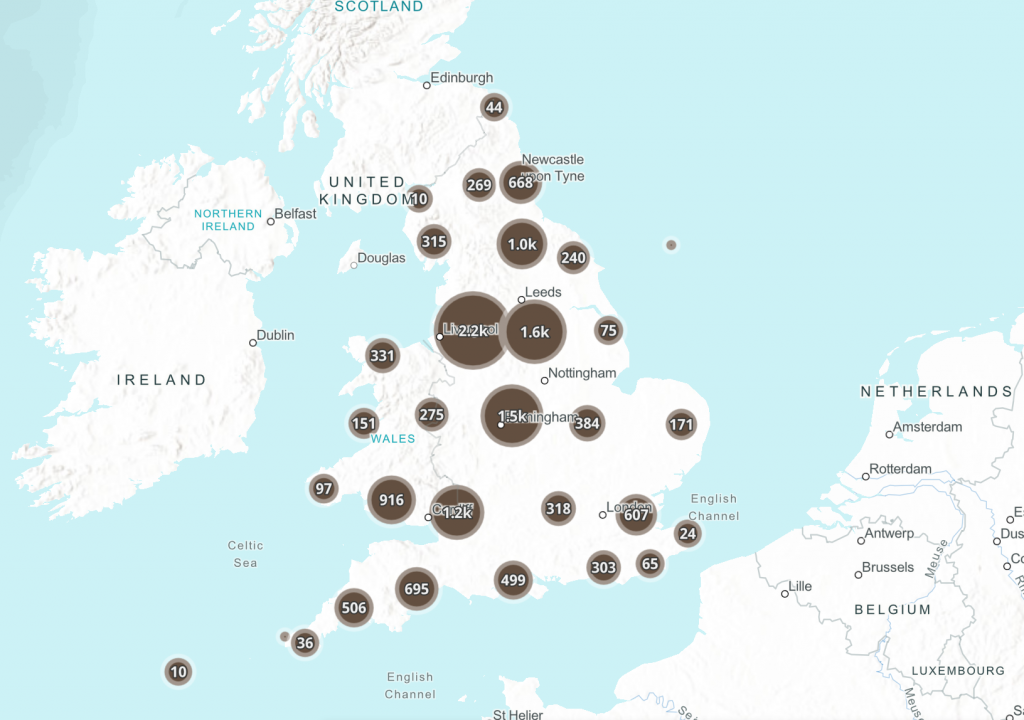
What’s being done to stop it?
David TC Davies, the current Secretary of State for Wales, voted to block a law requiring water companies to dump less sewerage in the rivers in 2021.
It was also recently revealed that in 2018, the Department for Environment, Food and Rural affairs told James Bevan, the Chief Executive of the Environment Agency, not to enforce new farm rules designed to protect water bodies from fertiliser pollution.
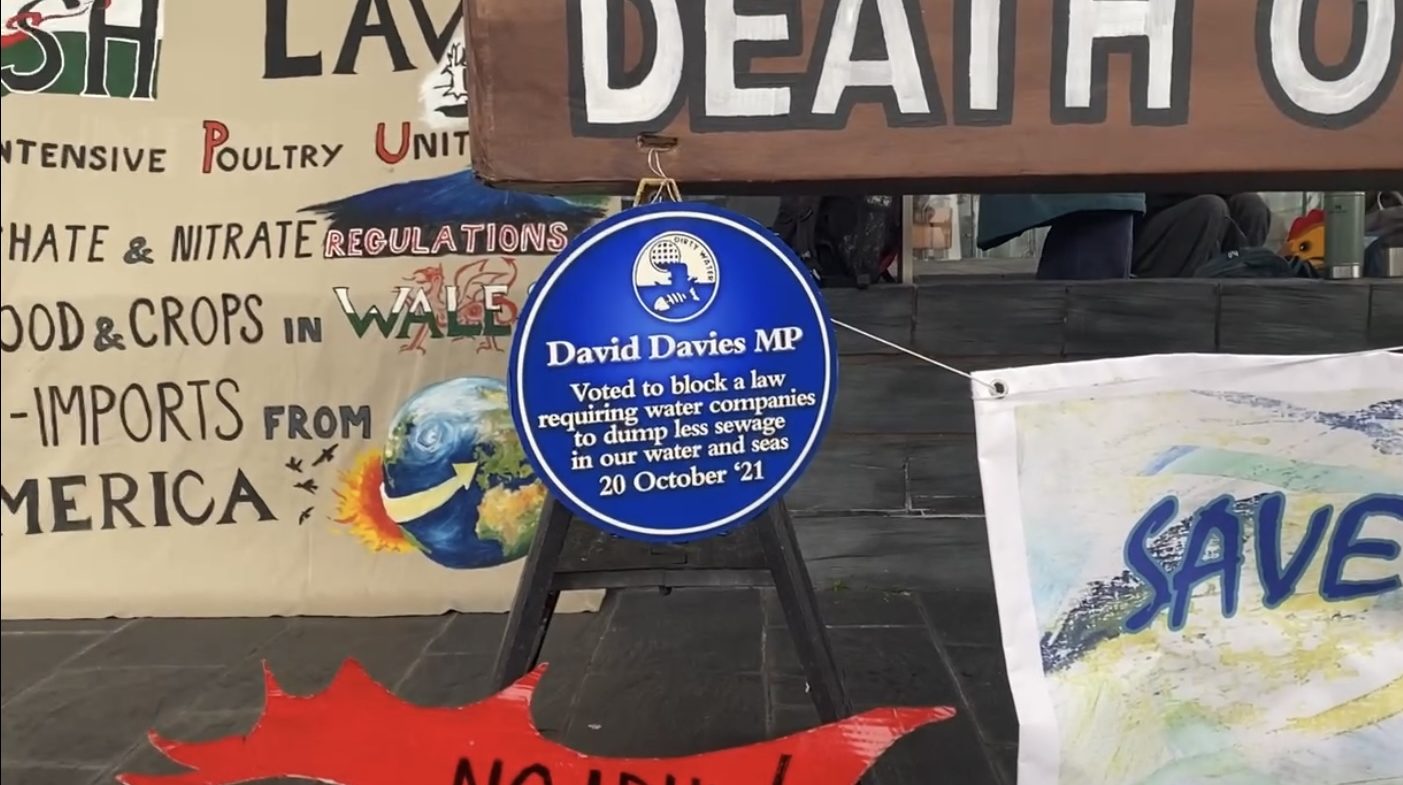
Campaigners across the country are calling for governments to legislate and regulate the waters properly, along with placing a freeze on the building of any more Intensive Poultry Units.
“We want legislators to legislate. Regulators to regulate and polluters across all sectors to address their performance, face fines or ultimately close down if they cannot adapt,” said Mr Waters.
“There is an argument that there already is enough legislation, but regulators are just ignoring it.”
“There are so many organisations, scientists and normal people out there calling for a change – why aren’t we winning?”
Back on the River Taff, the Rebel Mams have repeatedly called for Cardiff Council, Welsh Water and Natural Resources Wales to help clean up the river and have received the same answer.
“We’re all particularly concerned because we don’t see council making any efforts to clean up the river; they’re relying on volunteers to do that,” said Ms French.
“We asked a question at full council in January, asking ‘Who’s going to clean this up?’ and the answer was Cardiff Rivers Group (and) Keep Wales Tidy, which basically boils down to volunteers.”
The Rebel Mams have recently written a letter to local councillors, MPs, NRW and many others asking them to address the situation on the banks of the Taff:
What does the regulator say?
Natural Resources Wales is the regulatory body responsible for managing water resources in Wales, and has previously fined Welsh Water up to £180,000 for a polluting incident that killed 3,000 fish in the River Clywedog in North Wales.
When approached, NRW said in a statement that it is concerned about the impact of spillages on Wales’ water quality and is taking action through their Wales Better River Quality Taskforce.
The taskforce has published a series of plans to “gather greater evidence on the impact of the storm overflows on our rivers, reduce the impacts they cause, improve regulation and educate the public on sewer misuse”.
The statement says NRW will continue to challenge water companies to make sure the CSOs are properly controlled.
What can I do about it?
Angela Jones says everyone can help make a difference: “If you see something coming out of a pipe into a river that doesn’t look natural take a 10-second video of it. Write down where it is and what day and time it is.
“Then report it within 24 hours. You will get palmed off, but your report will be logged and environmentalists can access that data and see if there is an issue in a particular area.
“If pollution isn’t logged, then nothing gets done because no-one knows about it until the river and its wildlife is damaged beyond repair.
“No matter how small your contribution, it will make a difference.”
- To report an incident call: 0300 065 3000


